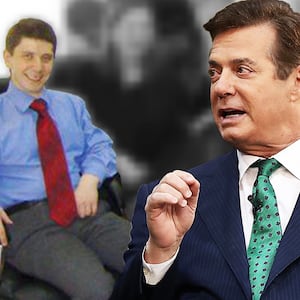A federal judge blasted Paul Manafort as a scheming liar who put fancy homes and expensive suits above the law—but then sentenced him to far less than the maximum.
President Trump’s former campaign chairman faced up to 10 years in prison for an illegal foreign lobbying conspiracy, on top of the 47 months he got last week for tax and bank fraud.
After a tongue-lashing, U.S. District Judge Amy Berman Jackson of Washington, D.C., gave him 73 months in the lobbying case, and ruled that 30 months of that would be served concurrently.
That means that his total sentence in both cases brought by Special Counsel Robert Mueller adds up to 7.5 years. He will also get credit for the nine months he has already served in jail.
It was noted that Manafort, 69, did not express any remorse at his sentencing in Virginia last Thursday. But he changed his tune Wednesday, arriving in a wheelchair with a sob story at the ready.
“I am sorry for what I have done and all the activities that have gotten us here today,” he told Jackson, touting a “new self-awareness” and begging for a break so he could care for his wife.
“This case has taken everything from me already,” the 69-year-old said. “Please let my wife and I be together.”
Jackson said she didn’t said she didn’t buy it.
“Saying, 'I’m sorry I got caught' is not an inspiring plea for leniency,” she told him.
“This defendant is not Public Enemy #1, but he is not a victim either,” Jackson said.
“It is hard to overstate the amount of money involved,” she added. “There is no good explanation for leniency requested.
“He cheated the U.S. treasury out of $6 million. Why? Not to support a family, but to sustain an opulent lifestyle... more houses than a family can enjoy, more suits than a man can wear.”
“What you were doing was lying to Congress and the American public,” she continued. “If people don’t have facts, democracy can’t work.”
In the Washington case, Manafort pleaded guilty to one count each of conspiracy against the U.S. and obstruction of justice in connection with failure to register as a lobbyist.
Prosecutor Andrew Weissman told the court that Manafort had “undermined our political process and subverted the due process of law” and said it was “hard to imagine a more righteous prosecution” of those violations.
“Something is wrong with the moral compass,” Weissman said, referring to Manafort’s repeated flouting of the law and court orders.
“Manafort’s means... and opportunities could have led to him to lead a life to be an example in this country, but at each juncture, he chose a different path.”
Manafort’s attorney, Kevin Downing, told the court that high-ranking U.S. government officials were aware of Manafort’s lobbying activities—and that he deserved leniency because of all the media attention he’s received.
“If not for a short stint as a campaign manager in a presidential election, I don't think we'd be here today,” Downing said.
Jackson delivered her sentence six days after the judge in the Virginia case, T.S. Ellis, gave Manafort a 47-month term—far less than the 24-year maximum—and inexplicably said the GOP operative who has worked on behalf of dictators and torturers had led an “otherwise blameless” life.
As the Wednesday’s hearing began, Jackson said the light sentence handed down by Ellis would have no bearing on the punishment she dished out. “What’s happening today cannot be a revision… of what happened in another court,” she said.
Jackson—who is also overseeing the case against Roger Stone—had previously taken a hard line against Manafort, yanking him off house arrest and tossing him in prison for violating a gag order she issued.
In addition, she voided his plea agreement with Mueller after prosecutors alleged he lied to the FBI and a grand jury about his contacts with former business partner Konstantin Kilimnik, a $125,000 payment from a political ally, and an unnamed investigation in another district.
From 2010 to 2014, Manafort worked as a political consultant for former Ukraine President Viktor Yanukovych and helped him win both elections at home and influence abroad alongside two lobbying firms, Mercury Public Affairs and the Podesta Group. The firms registered as the nominal clients of a think tank, the European Centre for a Modern Ukraine in Belgium, which acted as a figleaf to lobby for Yanukovych.
Along with Mercury and the Podesta Group, Manafort also hired the law firm Skadden Arps to write a report whitewashing Ukraine’s prosecution of Yanukovych’s former rival for the presidency.
Prosecutors charged that secrecy was “integral” to the success of the campaign. A foreign agent registration requires disclosures that would have tipped the public off that Manafort paid $4 million for its report—a fact which would have undermined Skadden’s public professions of independence. Failing to register also allowed Manafort to plant stories smearing Obama administration as anti-semitic while simultaneously letting his Ukrainian clients take credit for purporting to quash them.
Both Manafort and his business partner Kilimnik were charged with obstruction of justice for their outreach to witnesses in the case. Kilimnik had helped set up a group of former European political heavyweights like former Italian Prime Minister Romano Prodi and former Polish President Aleksander Kwasniewski—dubbed the Hapsburg Group—to covertly lobby on Yanukovych’s behalf. When Mueller’s office indicted Manafort, he and Kilimnik texted former associates in an attempt to convince them to testify that the group had only focused its efforts in Europe, not the US.
The scandal pushed the Podesta Group, once a K Street lobbying powerhouse, to close its doors. Tony Podesta resigned from the firm shortly after prosecutor announced Manafort’s indictment in October 2017 and his successor shuttered it shortly afterwards.
It also claimed former Obama White House counsel Greg Craig’s job at Skadden. Craig resigned from the firm in April 2018 and Skadden reached a settlement with the Justice Department over its work with Manafort. The firm registered as a foreign agent and paid $4.6 million—the cost of the report it produced for Manafort—in penalties under the terms of the agreement.
Mercury has nonetheless fared better under the Trump administration. The firm has been able to capitalize on its Trump administration connections and revenue is up.
The lobbying case has provided perhaps the closest look at the what prosecutor Andrew Weissman said was “the heart” of the special counsel’s Russia investigation.
Manafort’s violation of his plea deal forced details about the special counsel’s questioning into court filings and out into public view. In attempting to show Manafort lied about his interactions with Kilimnik, prosecutors revealed that Manafort had given 75 pages of internal Trump campaign polling to the suspected Russian intelligence associate shortly after the Republican National Convention. At the same August 2, 2016 meeting, prosecutors alleged that Kilimnik had passed Manafort a draft peace plan to settle the conflict in Ukraine on terms favorable to Russia.
While Jackson ruled that Manafort breached the agreement by lying about some of his communications, she didn’t agree with the prosecutors’ allegations that Manafort had lied about his outreach to Trump administration officials. Mueller’s team had argued that Manafort had lied about authorizing third parties to reach out to senior White House officials on his behalf because he was trying to “augment his chances for a pardon.”
Trump has called Manafort “brave” in public and praised him in private for his defiance of the special counsel’s office. He hasn’t ruled out a pardon for his former campaign chairman. Shortly after Manafort was sentenced in Virginia, White House press secretary Sarah Sanders said Trump would “make the decision when he’s ready.”









